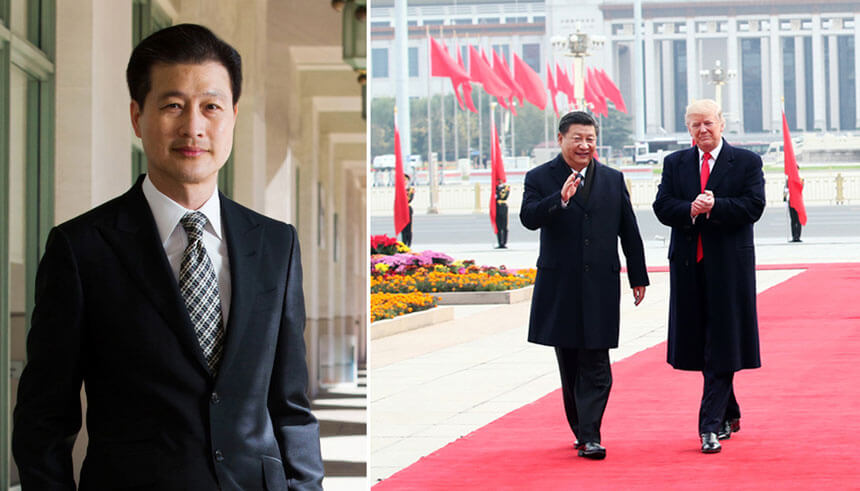U.S.-Asia Business
Dominic’s Take: A Lasting US-China Trade Deal Needs Trust
By Dominic Ng

East West Bank CEO Dominic Ng says even if a trade deal is reached, it will succeed only if Beijing and Washington draw up clear rules.
The fate of U.S.-China economic relations hangs in the balance leading up to the expected meeting between Presidents Xi and Trump to end the trade war. The damage of economic tensions has been felt on both sides: U.S. exports to China have seen steep drops in recent months, including of grains, oil, liquefied gas and passenger vehicles. The latest official data shows that Chinese exports to the U.S. have similarly contracted for three straight months, and Chinese investment in the United States has crashed from a height of $46 billion in 2016 to less than $5 billion in 2018.
Chances of a successful deal have increased after the most recent round of negotiations in Washington in mid-February. A deal between the U.S. and China would be a desirable outcome that could help mitigate a longer-term rupture, but only if it sticks. For that to happen, China and the U.S. will need more than just good negotiating skills – they will need a strategy to rebuild trust.
In my view, a few key steps are needed:
First, we need to draw clear lines between national security-relevant and purely commercial activities.
Even an optimal deal will leave U.S.-China tensions heightened under the weight of new strategic security concerns. But this doesn’t mean U.S.-China commercial ties must be severed; there is still vast potential to expand commercial activity in non-sensitive domains. A modicum of “disengagement” can be managed with a reasonable understanding of where rational national security restrictions are necessary, preserving space for normal commerce. Surely U.S. soybean farmers need not suffer due to U.S. concerns about exports of dual-use technology.
A key challenge to overcome is that national security boundaries have expanded in recent years and have yet to be re-drawn. In the investment realm, the Foreign Investment Risk Review Modernization Act (FIRRMA) has led to a sweeping overhaul of U.S. investment screening, but core elements of the legislation are still unclear, including which technologies will be subject to special scrutiny. In China, new regulations such as the Cyber Security Law have likewise created uncertainty for foreign investors.
Policies like these are depressing businesses’ willingness to invest in future growth and innovation. Firms from both nations must be able to confidently assess which areas are allowed for commercialization and which are off limits without fear of those lines being constantly re-drawn.
Second, we need to accept structural differences in economic systems and work toward a compromise that respects each nation’s interests.
One reason U.S.-China relations have soured is that the U.S. had expectations about China’s economic model converging to liberal Western norms. As these notions have been frustrated, both parties must set reasonable expectations, given China’s legacy and development model. However, there must be a common understanding of shared principles governing economic and commercial relations. This will require China to make good on its Third Plenum economic reform commitments in areas such as market access, state-owned enterprise reform and competition—all steps that are in China’s core internal interest. It will also require the U.S. to accept that certain systemic differences will remain a permanent component of U.S.-China relations.
Third, we need concrete mechanisms to measure outcomes and progress.
Once both sides have agreed on a shared vision and related commitments, there must be a list of measurable outcomes established to provide parties a clear understanding of next steps. This requires both broad indicators—like a quantifiable reduction in the use of investment restrictions to achieve Chinese industrial policy goals—and narrow measures, such as volumes of export and investment growth in specific products (e.g. U.S. agricultural or semiconductor exports) and industries (e.g. U.S. investment in the Chinese financial or automobile industries).
These measurable outcomes are necessary to give U.S. leaders confidence that commitments will be kept. A robust agreement tied to certain achievements and milestones will also give China confidence that future U.S. administrations will honor the negotiated outcomes.
Fourth, it is more critical than ever before that governments guarantee due process and free movement of their citizens.
One lamentable outcome of heightened U.S.-China tensions is that researchers, executives, students and other individuals are increasingly at risk of getting tangled up in defensive policies and political gamesmanship.
In the U.S., authorities have recently tightened visa requirements for Chinese students in certain areas, reflecting general suspicion of Chinese graduate students. The U.S. has also ramped up law enforcement efforts on suspected cases of espionage and other violations of law. While criminal behavior must be vigilantly prosecuted, this campaign has also led to several cases of Chinese-Americans like Sherry Chen being wrongly accused of conspiring with the Chinese government. Finally, President Trump’s comments in the case of Huawei CFO Meng Wanzhou have created the perception in China that the U.S. does not apply rules evenly and is using Meng as a bargaining chip in trade negotiations.
The same tendencies are prevalent in China. New rules are restricting scientific collaboration with foreign researchers, and the detention of two Canadian citizens has recently sent shockwaves through the foreign business community.
If not addressed, these developments will have a chilling effect on collaborative business and research communities in both countries, which will in turn further undermine trust. China and the U.S. must reassure that laws will be transparently and fairly applied to firms, executives and individuals.
As negotiators continue working toward a resolution to the costly trade dispute, I implore them to consider not just the negotiated "wins" necessary to make a deal palatable, but also what steps must be taken to rebuild trust and assure a deal survives in the months and years that follow.
This editorial first appeared on the South China Morning Post.

